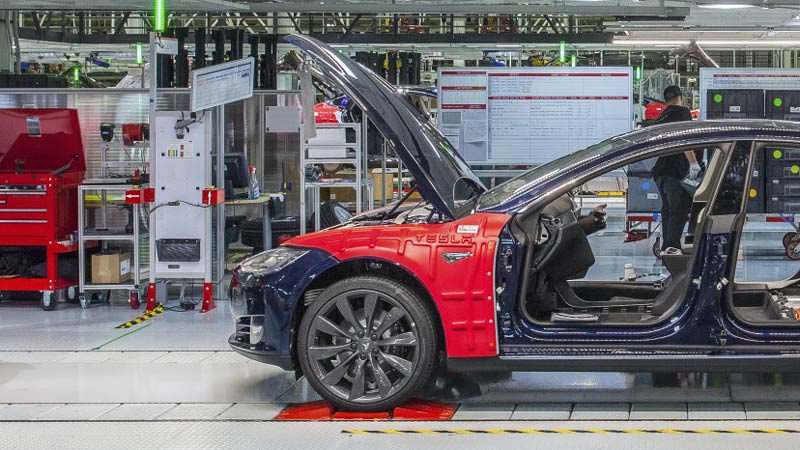Tesla CEO and co-founder Elon Musk has welcomed an announcement by the state of California that Covid-19 shelter-in-place restrictions will start to be lifted, heralding a return to manufacturing for the electric car maker.
The governor of California confirmed that the state would move from a “state of preparedness” to a return to work for certain shops, manufacturing and logistics operations on Friday, May 8 (US time). Information on the state’s website requires that manufacturing companies must show that they have reduced the risk of spreading Covid-19 before reopening for business.
Although Tesla’s Fremont Gigafactory has been shuttered since late March after initially appearing to defy the shelter-in-place orders put in place by the Californian state government, Tesla reported a $US16 million ($A24.5 million) profit, the first profit for what is typically a non-profitable quarter, at its Q1 2020 earnings call in late April.
An increase in inventory that Tesla was unable to deliver towards the end of the first quarter, until it put touchless delivery protocols in place, has meant that cash flow could continue as vehicles were handed over to customers.
In several regions, the ability to order online and deliver vehicles without contact has seen the EV maker outstrip legacy car makers in sales in April, such as in the UK where Tesla claimed the number one spot for new car sales across the entire industry. which was otherwise decimated to the tune of 97.3% sales volume.
In Australia, electric car sales are holding steady despite a halving of new car sales across the entire market, with Tesla’s Model 3 still holding a claim on 70% of the fledgling market despite the fact no Tesla cars have been shipped to Australia since February.
But Musk has warned that although Tesla will likely weather the Covid-19 economic storm, other businesses such as its suppliers will suffer as a result of the Covid-19 restrictions, which he personally railed against at the company’s first-quarter earnings call saying, “Give people back their goddamn freedom.”
In early April, Tesla furloughed around half of its staff according to company insiders who spoke to CNBC. A return to work would allow Tesla to restart production of its Model 3 and Model Y and put money back in the pockets of its employees.
On Thursday evening (US time), governor of California Gavin Newsom announced via Twitter that certain freedoms would indeed be returned starting Friday, including clothing, book, and sporting stores and florists along with manufacturing and logistics associated with these sectors.
Musk responded with a resounding, “Yeah!!”
Yeah!!
— Elon Musk (@elonmusk) May 7, 2020
The response comes just days after Musk may have ticked the necessary boxes to unlock the first tranche of a massive $US55 billion ($A84 billion) compensation package as Tesla’s valuation hit the $A100 billion mark ($A153 billion), even as the CEO stunned Twitter by saying Tesla’s shares were too high.
The state of California, which has the fifth-greatest number of confirmed Covid-19 cases at 61,902 according to The Guardian, is currently in a “Safety and Preparedness” stage 1 to prepare to restart the economy. On Friday, it will move to a “Lower-risk Worlplaces” stage 2, wherein it will Gradually reopen retail (curbside only), manufacturing & logistics. Later, relax retail restrictions, adapt & reopen schools, child care, offices & limited hospitality, personal services” according to the website.
There are reports that Tesla has already begun preparations for a reopening. On Wednesday (US time), the San Francisco Chronicle reported that Fremont Gigafactory insiders said some workers had returned to the factory to ready it for reopening, and that safety and hygiene measures had been put in place.
The Fremont factory closure in March shortly after the car maker started customer deliveries of its fourth production electric vehicle, the Model Y, on March 15, 2020.
Musk believes the Model Y will prove even more popular than the Model 3, which has been upending auto markets and driving a transition to clean, electric private transport.
In the first quarter of 2020, Tesla delivered (and therefore marked as sold) 76,200 Model 3 and Model Y electric cars, and more than 88,000 vehicles including the premium Model S and Model X.
Overall, 103,000 vehicles were produced, including at its Shanghai Gigafactory which started rolling Model 3s off the factory floor at the tail end of 2019.
Tesla has previously given guidance that it would “comfortably exceed” output of 500,000 vehicles in 2020, and at the first-quarter earnings Musk did not alter that guidance despite the Covid-19 closures.
On Thursday, the South China Morning Post reported that Tesla’s Shanghai factory – the only one continuing to make the Model 3 at this time – had unexpectedly stopped production, with a parts shortage blamed. However Tesla blog Tesmanian has since reported that Tesla China confirmed that the temporary closure is part of a normal production schedule adjustment/maintenance.

Bridie Schmidt is associate editor for The Driven, sister site of Renew Economy. She has been writing about electric vehicles since 2018, and has a keen interest in the role that zero-emissions transport has to play in sustainability. She has participated in podcasts such as Download This Show with Marc Fennell and Shirtloads of Science with Karl Kruszelnicki and is co-organiser of the Northern Rivers Electric Vehicle Forum. Bridie also owns a Tesla Model Y and has it available for hire on evee.com.au.


